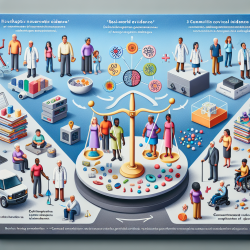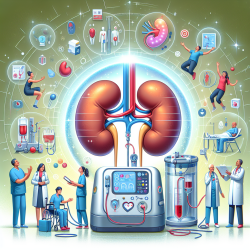Understanding the Impact of GARDIAN on Neuronopathic Gaucher Disease
In the realm of rare diseases, neuronopathic Gaucher disease (nGD) stands out due to its complexity and the challenges it presents in both diagnosis and treatment. The recent research article titled "A global neuronopathic Gaucher disease registry (GARDIAN): a patient-led initiative" provides a comprehensive overview of how a patient-driven registry can bridge the knowledge gaps in understanding and managing nGD.
The Importance of Real-World Data
The GARDIAN registry, initiated by the International Gaucher Alliance (IGA), is a groundbreaking effort to collect real-world data from patients and caregivers. This initiative emphasizes the importance of patient-reported outcomes (PRO) and observer-reported outcomes (ObsRO) to capture the true impact of nGD on patients' lives. By involving patients and caregivers in the data collection process, GARDIAN ensures that the data reflects the real-world challenges faced by those living with nGD.
Key Findings and Implications for Practitioners
The research highlights several critical findings:
- Comprehensive Data Collection: GARDIAN identified 138 core data elements that cover demographics, diagnostic information, health status, and more. This comprehensive data set provides a holistic view of the disease and its impact.
- Patient and Caregiver Involvement: The registry's design involved extensive input from patients and caregivers, ensuring that the data collected is relevant and actionable.
- Real-World Evidence (RWE): The data collected through GARDIAN can be used to support clinical trials and regulatory decisions, offering a robust foundation for developing new treatments and therapies.
How Practitioners Can Leverage GARDIAN
For practitioners, the insights from GARDIAN offer several opportunities to enhance patient care:
- Personalized Treatment Plans: By understanding the specific challenges faced by nGD patients, practitioners can tailor treatment plans to address individual needs.
- Improved Patient Engagement: Engaging patients in their care through PRO and ObsRO can lead to better health outcomes and increased patient satisfaction.
- Collaboration with Patients and Caregivers: Encouraging open communication and collaboration with patients and caregivers can lead to more effective care strategies.
Encouraging Further Research
While GARDIAN provides a wealth of data, there is still much to learn about nGD. Practitioners are encouraged to use the registry as a resource for further research, exploring new treatment options and improving the quality of life for patients. By contributing to and utilizing the data from GARDIAN, healthcare providers can play a crucial role in advancing the understanding and management of nGD.
To read the original research paper, please follow this link: A global neuronopathic gaucher disease registry (GARDIAN): a patient-led initiative.










